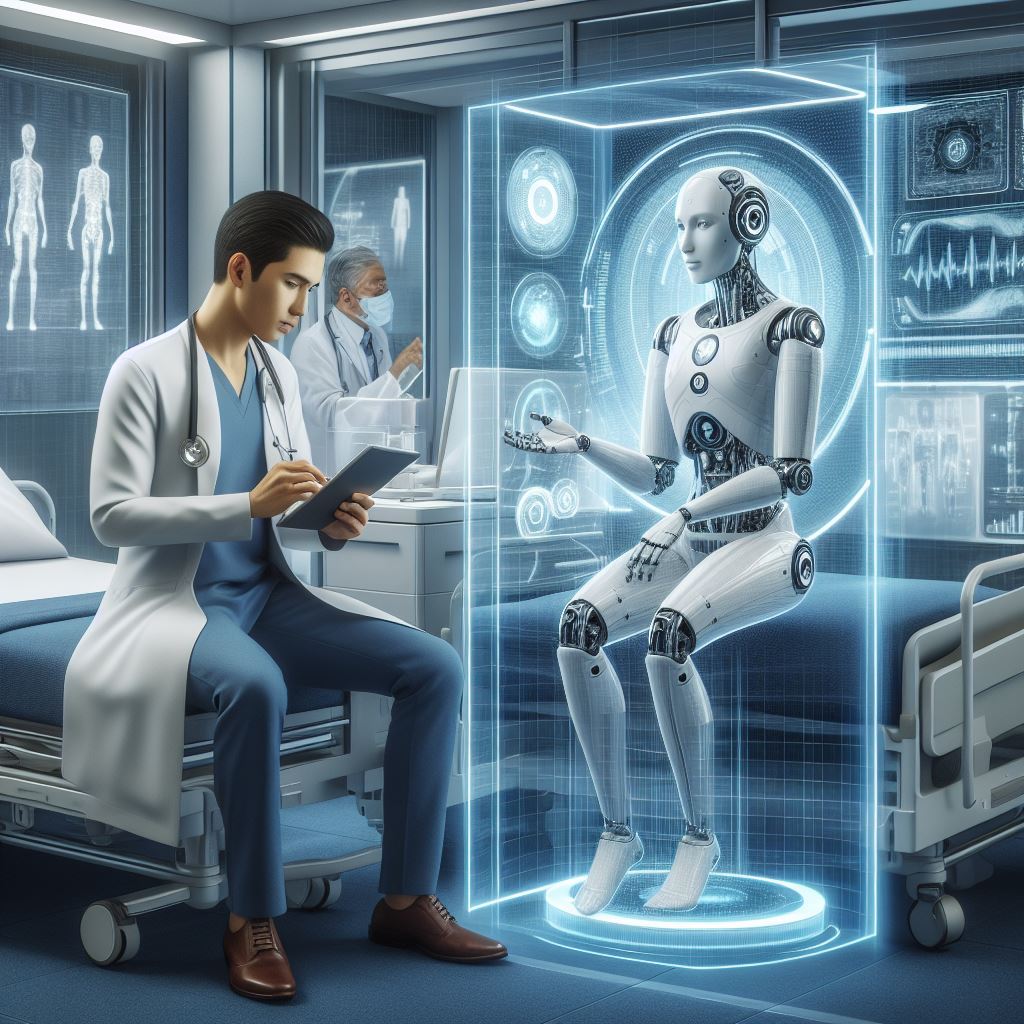Medicine is undergoing a silent revolution, driven by Artificial Intelligence (AI).
A Artificial Intelligence in Medicine is becoming a transformative force in the healthcare field.
This revolution, driven by Artificial Intelligence in Medicine, is changing the way doctors diagnose and treat illnesses, how researchers discover new treatments, and how patients receive personalized care.
In this article, we will explore five ways in which Artificial Intelligence in Medicine is revolutionizing the medical world, opening new paths to more accurate diagnoses, more effective treatments and more personalized healthcare.
Table of contents

A Artificial Intelligence in Medicine is transforming the world of healthcare in innovative and revolutionary ways.
Below, we'll look at the five ways in which Artificial Intelligence in Medicine is changing the medical field.
I invite you to enter the fascinating universe of Artificial Intelligence applied to Medicine.
Artificial intelligence in medicine: 5 innovations
1. Disease Diagnosiss:
Artificial Intelligence (AI) in Medicine is being used to analyze medical images and laboratory test data.
This helps healthcare professionals diagnose diseases with greater accuracy and efficiency.
With its ability to learn and adapt, AI is contributing to the identification of diseases more accurately and quickly.
This technology uses machine learning algorithms to process large volumes of medical data, such as MRI images, CT scans, and electronic health records.
These algorithms are trained to recognize patterns and anomalies that may indicate the presence of a disease.
For example, this approach has been used to detect skin, lung, breast and prostate cancers with accuracy comparable to that of doctors.
Additionally, it can identify signs of heart disease and diabetes in blood tests and retinal images.
AI also has the ability to predict a patient's risk of developing a disease in the future based on their medical history, lifestyle and genetics.
This allows for preventative interventions and personalized treatments.
2. Disease Prediction Through Artificial Intelligence:
AI can analyze large volumes of health data, such as medical histories, imaging and genomics, to identify patterns that may indicate a person's risk of developing a specific disease.
This allows for early intervention, which can significantly improve patient outcomes.
For example, machine learning algorithms have been used to predict the risk of heart disease.
These algorithms can analyze risk factors such as age, gender, smoking status, blood pressure and cholesterol levels to predict an individual's risk of developing heart disease in the next 10 years.
Similarly, AI has been used to predict the risk of type 2 diabetes. AI algorithms can analyze health data, including age, body mass index, family history of diabetes, and blood glucose levels, to predict risk of an individual developing type 2 diabetes.
Furthermore, AI has also been used in predicting neurological diseases such as Alzheimer's disease.
AI algorithms can analyze brain images to identify early signs of the disease, enabling early intervention and potentially slowing the progression of the disease.
However, despite the potential of AI in disease prediction, there are challenges.
The accuracy of AI algorithms depends on the quality and quantity of available health data. Furthermore, ethical and privacy issues must be considered when using health data to predict diseases.
3. Artificial Intelligence in the Processing of Genetic Data:
Cutting-edge technology is revolutionizing the field of medicine, especially in the processing of genetic data. It can analyze large volumes of genomic data efficiently and accurately, identifying patterns and correlations that would be difficult for humans to detect.
Artificial Intelligence (AI) can be used to predict disease susceptibility based on genetic variations. Machine learning algorithms can analyze an individual's genome and identify mutations that are associated with certain diseases. This may allow for preventive interventions or personalized treatments.
Furthermore, AI can help in the discovery of new medicines. By analyzing the genetic structure of pathogens, she can identify potential targets for new drugs. This can significantly speed up the drug discovery process.
This technology can also be used to personalize medical treatments. Based on a patient's genetic profile, it can be predicted how the patient will respond to different treatments. This can lead to more effective treatment and fewer side effects.
4. Real-Time Health Monitoring:
AI enables the continuous collection of patient health data through wearable devices such as smart watches and heart rate monitors.
These devices collect a variety of information, including heart rate, blood pressure, blood oxygen levels and sleep patterns.
This data is then analyzed by AI algorithms to identify patterns and trends. This can help detect health problems at an early stage, allowing for faster and more effective interventions.
Additionally, AI can provide reminders to take medications, schedule doctor appointments, and maintain a healthy lifestyle. This is especially helpful for patients with chronic illnesses such as diabetes and heart disease.
This not only improves health outcomes, but also empowers individuals to take control of their own health.
5. Medical Research:
A Artificial Intelligence in Medicine is being used to accelerate medical research by analyzing large volumes of data to identify patterns and trends.
A Artificial Intelligence in Medicine is just starting to show its true potential.
AI has the potential to transform medicine by enabling researchers to analyze large volumes of data more quickly and efficiently than would be possible manually.
This can lead to faster discoveries, more effective treatments and better outcomes for patients.
AI can analyze data from a variety of sources, including electronic medical records, medical images, laboratory test results, and even social media posts.
By analyzing this data, AI can identify patterns and trends that may not be immediately apparent to human researchers.
For example, AI can be used to identify patterns in medical images that could indicate the presence of a disease. This may allow for earlier diagnosis and more effective treatment.
Similarly, AI can analyze data from electronic medical records to identify trends in diseases and treatments, which can lead to better prevention and treatment strategies.
Furthermore, AI can be used to accelerate the development of new medicines. By analyzing data from clinical trials and other research, AI can help identify promising compounds and predict their effectiveness and safety.
Conclusion:
As technology advances, we can expect to see even more innovative and revolutionary applications of Artificial Intelligence in Medicine.
However, AI does not replace doctors. Instead, it serves as a powerful tool that helps doctors make more accurate diagnoses and more informed treatment decisions.
We are on the threshold of a new era in medicine, an era where AI can help us diagnose diseases faster, develop more effective treatments, and deliver personalized healthcare like never before.
The future of Artificial Intelligence in Medicine It's bright and full of possibilities. We are excited to see what the future holds.
Source: https://blog.iclinic.com.br/inteligencia-artificial-na-medicina/







